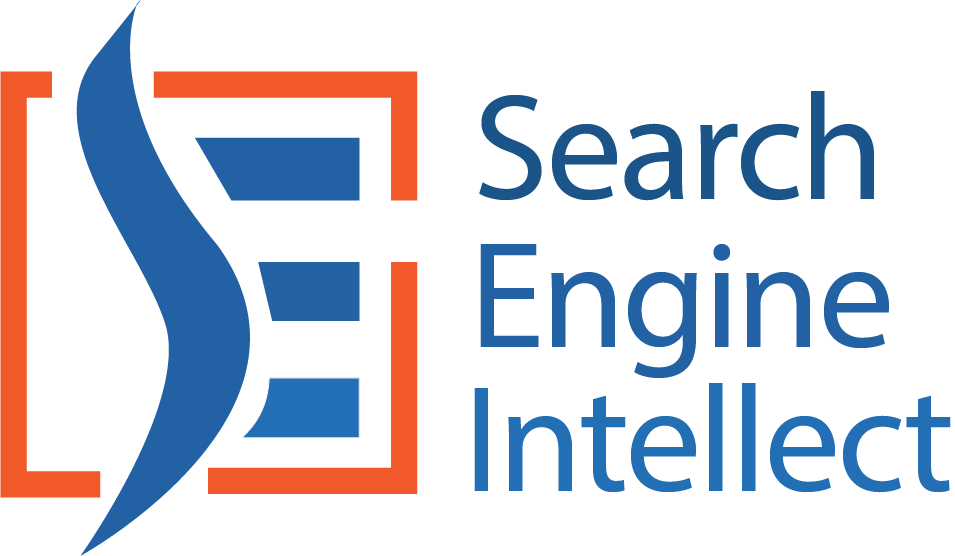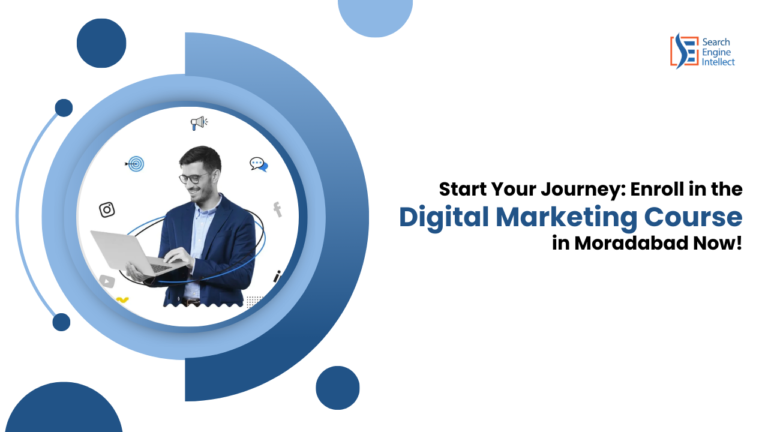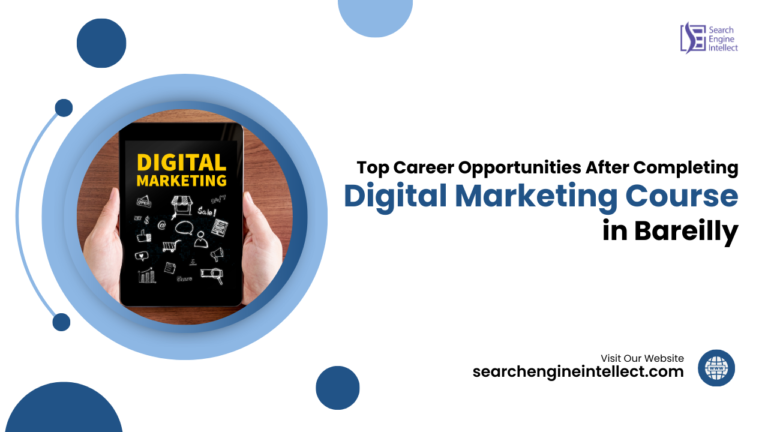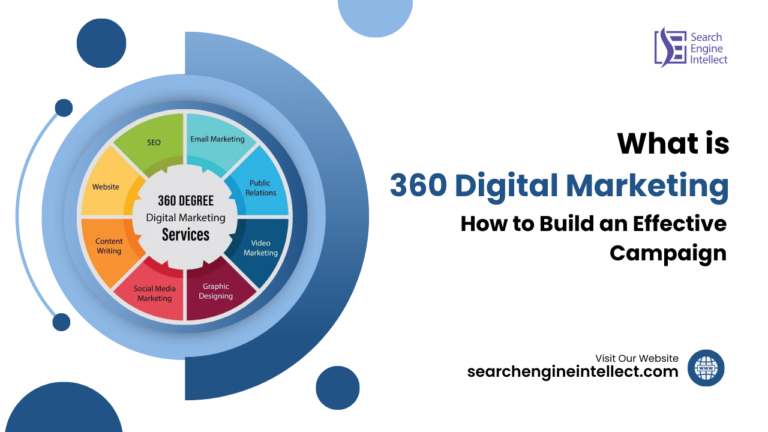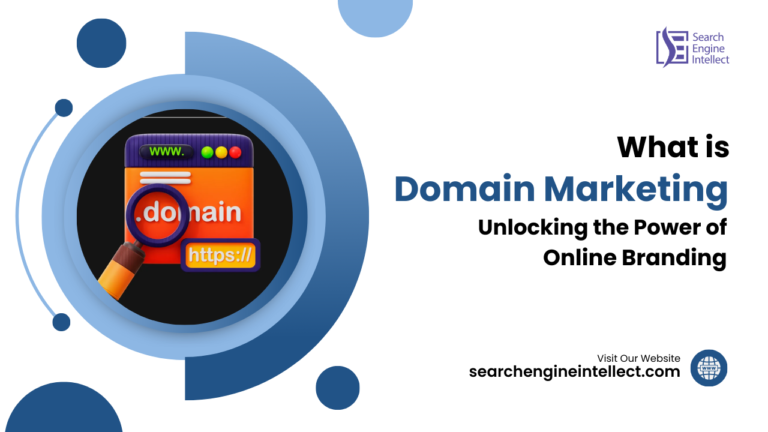Table of Contents
Book a Free Demo Class
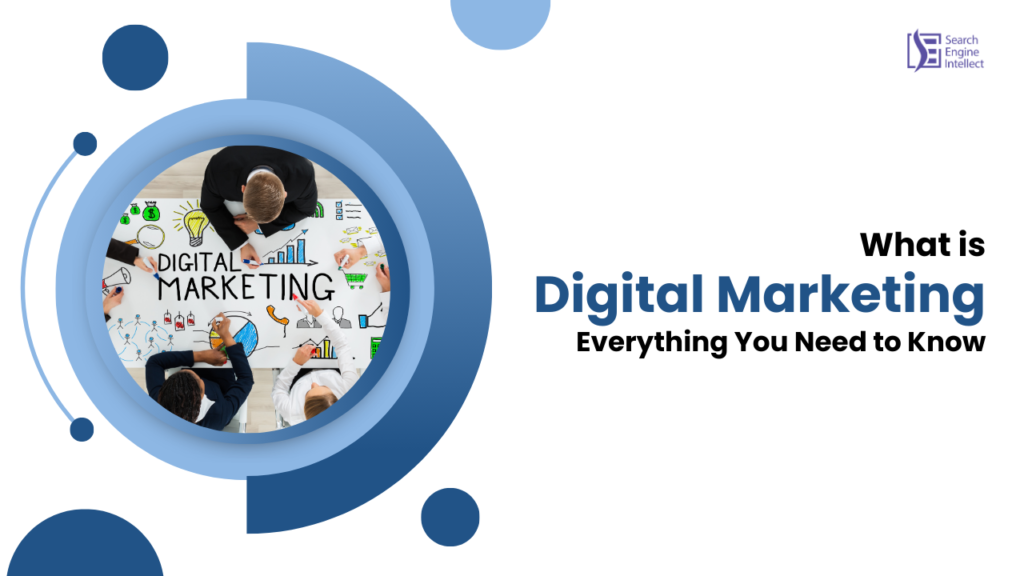
What is Digital Marketing: Everything You Need to Know
Marketing has changed a lot in the past decade. Earlier, businesses relied on billboards, newspapers, and TV ads to reach customers. Today, most people spend their time online—on social media, search engines, and websites. This shift has given rise to digital marketing, a modern way to connect with customers where they are most active.
In simple words, it is the process of promoting your products, services, or brands using online platforms like Google, Facebook, Instagram, and email. It allows businesses to target specific audiences, track results, and reach more people compared to traditional methods.
Understanding the meaning of digital marketing is crucial for any business that wants to grow in today’s competitive world. It helps you reach the right customers, generate quality leads, and increase revenue without wasting money on untargeted campaigns.
Want to take your business online? Check out our Digital Marketing Services to get started.
What is Digital Marketing?
Digital marketing is the practice of promoting products, services, or brands using online channels and technologies. It connects businesses with their target audience through platforms like search engines, social media, email, and websites.
Simply put, it is marketing done through websites, search engines, social media, email, and paid advertisements instead of traditional methods like print or TV.
Digital Marketing Definition
Digital marketing is the use of digital tools, channels, and techniques to increase brand visibility, attract leads, and drive sales online. It includes both free (organic) methods like SEO and paid campaigns like PPC.
Why is Digital Marketing Important Today?
- Helps businesses reach a global audience quickly.
- Cost-effective compared to traditional marketing.
- Provides measurable results through analytics.
- Enables real-time engagement with customers.
- Boosts brand credibility and trust online.
With the digital economy growing rapidly, having a strong digital marketing strategy is no longer optional—it’s essential for survival and growth.
Also read: Why Choose Digital Marketing as a Career in 2024
What Does Digital Marketing Include?
Digital marketing includes a set of online strategies and tools that help businesses reach, engage, and convert their audience effectively. It goes beyond just social media or ads — it’s a complete system designed to build visibility, attract leads, and drive sales.
Here’s what it typically includes:
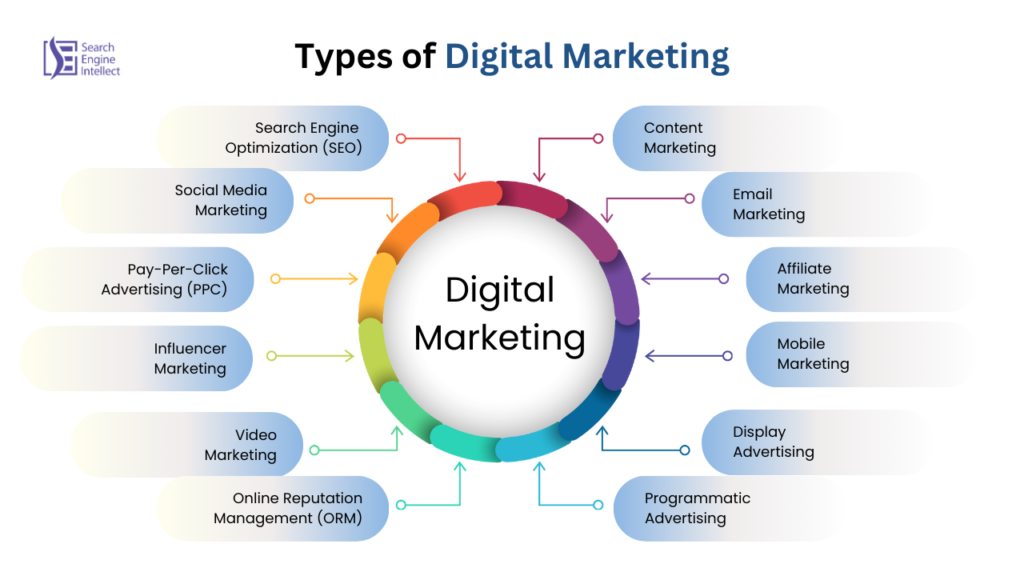
1. Search Engine Optimization (SEO)
SEO is the process of optimizing a website to improve its visibility in search engine results pages (SERPs).
Key Elements:
- Keyword Research: Identifying relevant keywords that potential customers use to find products or services.
- On-Page SEO: Optimizing individual web pages to improve their ranking, including content, meta tags, and URLs.
- Off-Page SEO: Building high-quality backlinks from reputable sites to enhance authority and ranking.
- Technical SEO: Ensuring the website is technically sound, including site speed and mobile-friendliness.
Also read: Enroll in the Best SEO Course in Bareilly Today!
2. Content Marketing
Content marketing involves creating and distributing valuable, relevant content to attract and engage a target audience.
Key Elements:
- Blog Posts: Writing informative articles that address customer pain points.
- Videos: Creating engaging video content to explain products or services.
- Infographics: Using visual content to present complex information clearly.
- E-books and Whitepapers: Offering in-depth resources that provide value to potential customers.
3. Social Media Marketing
Definition: Social media marketing leverages platforms like Facebook, Instagram, Twitter, and LinkedIn to build connections with potential customers.Key Elements:
- Content Creation: Developing engaging posts, stories, and ads that resonate with followers.
- Community Engagement: Interacting with followers through comments, messages, and live sessions.
- Analytics: Monitoring social media performance to refine strategies and improve engagement.
Also read: Enroll in the Best Social Media Marketing Course in Bareilly today!
4. Email Marketing
Email marketing is a direct form of communication that involves sending promotional messages to a list of subscribers.
Key Elements:
- List Building: Growing an email list through sign-ups, lead magnets, and opt-in forms.
- Segmentation: Dividing the email list into segments based on demographics, behaviors, or preferences for targeted messaging.
- Personalization: Customizing emails to address the specific needs and interests of recipients.
- Automation: Setting up automated email campaigns for welcome messages, follow-ups, and promotions.
Also read: Email Marketing Course in Bareilly – Lead Generation Training
5. Pay-Per-Click Advertising (PPC)
PPC is an online advertising model where advertisers pay each time a user clicks on their ad.
Key Elements:
- Ad Platforms: Utilizing platforms like Google Ads and social media ads to reach potential customers.
- Keyword Targeting: Bidding on specific keywords to display ads in search results.
- Ad Creation: Designing compelling ad copy and visuals to attract clicks.
- Performance Tracking: Monitoring ad performance to optimize campaigns and improve ROI.
Also read: Google Ads Training in Bareilly – PPC Mastery Course
6. Affiliate Marketing
Affiliate marketing is a performance-based marketing strategy where businesses reward affiliates for driving traffic or sales through their marketing efforts.
Key Elements:
- Affiliate Partnerships: Collaborating with affiliates who promote products or services in exchange for a commission.
- Tracking and Analytics: Using tracking tools to measure affiliate performance and sales generated.
- Commission Structures: Establishing clear commission rates and payment terms for affiliates.
Also read: Affiliate Marketing: What it is and How to Get Started
7. Influencer Marketing
Influencer marketing leverages the reach and credibility of influencers to promote products or services.
Key Elements:
- Partnerships: Collaborating with influencers who align with the brand’s values and target audience.
- Content Creation: Working with influencers to create authentic content that showcases products.
- Performance Tracking: Measuring the impact of influencer campaigns on brand awareness and sales.
8. Mobile Marketing
Mobile marketing focuses on reaching customers through mobile devices, including smartphones and tablets.
Key Elements:
- Responsive Design: Ensuring websites and emails are mobile-friendly.
- SMS Marketing: Sending promotional messages via text to engage customers.
- Mobile Apps: Creating mobile applications to enhance customer experience and engagement.
- Location-Based Marketing: Utilizing GPS technology to send targeted offers based on a user’s location.

9. Video Marketing
Video marketing involves using video content to promote products, services, or brand messages.
Key Elements:
- Content Creation: Producing engaging videos that resonate with the target audience.
- Platforms: Utilizing platforms like YouTube, Instagram, and TikTok to share video content.
- Analytics: Measuring video performance through views, engagement, and conversion rates.
10. Display Advertising
Display advertising combines text, images, and URLs to promote products or services across various websites.
Key Elements:
- Ad Formats: Utilizing various formats such as banners, sidebars, and pop-ups.
- Targeting Options: Using demographic and behavioral targeting to reach specific audiences.
- Retargeting: Displaying ads to users who have previously visited the website to encourage conversions.
11. Online Reputation Management (ORM)
Definition: ORM involves monitoring and managing a brand’s online reputation.Key Elements:
- Review Management: Encouraging positive customer reviews and addressing negative feedback.
- Social Listening: Monitoring social media mentions and conversations about the brand.
- Crisis Management: Developing strategies to handle negative publicity and protect brand reputation.
12. Programmatic Advertising
Definition: Programmatic advertising uses automated technology to buy and sell online advertising space.Key Elements:
- Real-Time Bidding: Allowing advertisers to bid for ad space in real-time.
- Targeting: Utilizing data to target specific audiences based on behavior and preferences.
- Efficiency: Streamlining the ad buying process to save time and resources.
Also read: What is 360 Digital Marketing and How to Build an Effective Campaign?
Why Digital Marketing Matters for Your Business
Digital marketing is no longer optional. It’s a must-have for any business that wants to grow in today’s competitive market. Here’s why it matters:
1. Reach the Right Audience
Traditional ads target everyone. Digital marketing targets the people most likely to buy from you. Through SEO, social media, and paid campaigns, you can reach the right customers at the right time.
2. Generate Quality Leads
Lead generation is easier and more cost-effective with digital tools.
- SEO drives organic traffic.
- Paid ads bring instant exposure.
- Email marketing nurtures leads over time.
Example: Businesses using targeted digital campaigns see up to 3x more leads compared to traditional marketing.
3. Boost Sales and Conversions
A strong online presence builds trust. When people find your brand on search engines, social platforms, and ads, they’re more likely to purchase. Digital marketing makes the buying process smooth and measurable.
4. Build Long-Term Brand Authority
Consistent digital marketing creates brand awareness and positions your business as an expert.
- Blog content answers customer questions.
- Social media increases engagement.
- SEO builds trust in search results.
5. Measurable and Scalable
Unlike traditional marketing, you can track every click, view, and conversion. Tools like Google Analytics and Meta Ads Manager give real-time data to optimize campaigns for better ROI.
Key Benefits
Everything About Digital Marketing
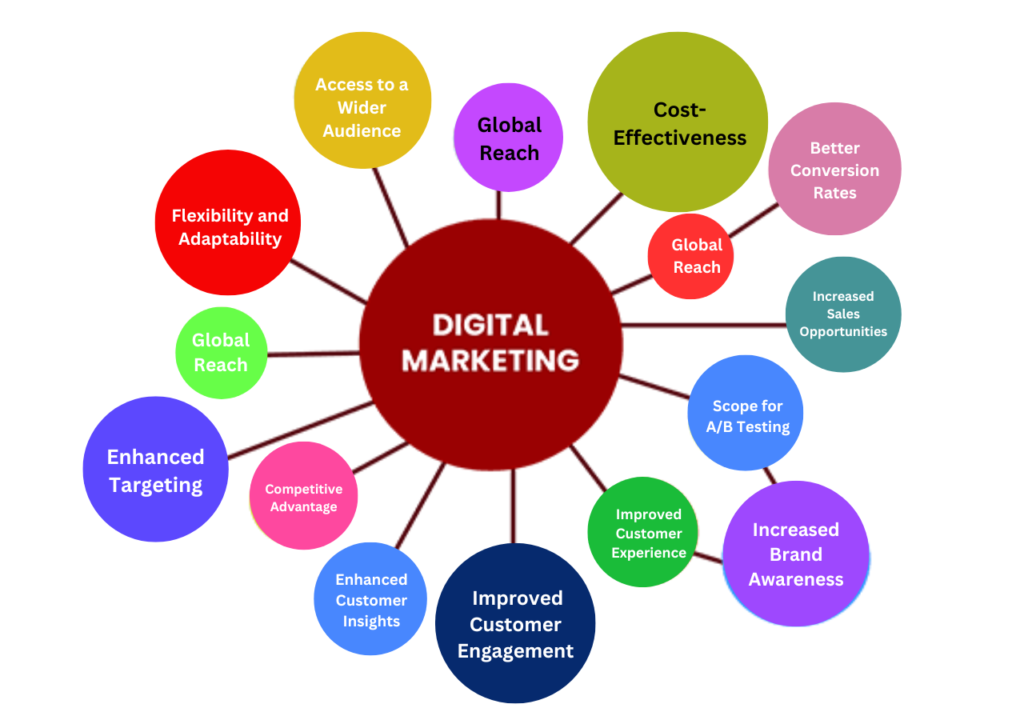
Digital marketing has transformed how businesses connect with their audience. From small startups to established brands, everyone is using it to grow online presence and drive sales. Below are the key benefits every business should know:
1. Reach a Wider Audience
- Target customers across cities, countries, or globally.
- No geographical limits like traditional marketing.
- Helps you find potential buyers where they spend most of their time – online.
2. Cost-Effective Campaigns
- Lower cost than print, TV, or outdoor ads.
- Choose your budget – from small startups to big brands.
- Pay only for results with channels like PPC and social media ads.
3. Measurable Results
- Tools like Google Analytics and Search Console provide real-time performance data.
- You can track clicks, leads, and conversions to optimize campaigns efficiently.
4. Improved Customer Engagement
- Engage directly with your audience through comments, chatbots, and email newsletters.
- Quick feedback helps build stronger customer relationships.
5. Higher Return on Investment (ROI)
- Better conversion rates compared to traditional marketing.
- Automated tools save time and resources.
- Data-driven strategies ensure you spend smarter, not more.
6. Stronger Brand Presence
- Build trust through consistent online visibility.
- Engage with your audience on multiple platforms.
- Establish your brand as an authority in your niche.
Want to enjoy these benefits for your own business? Start your digital marketing journey today with Search Engine Intellect and unlock higher visibility, leads, and growth.
Also read: Best Digital Marketing Course in Bareilly 2024
How to Get Started with Digital Marketing
Starting with digital marketing doesn’t need to feel overwhelming. Follow these steps to set a strong foundation and see real results.
1. Set Clear Goals
Decide what you want from digital marketing.
Do you want leads? More website traffic? Brand awareness?
Your goals will decide your strategy and budget.
2. Identify Your Audience
Know who you want to reach.
Define their age, location, interests, and online behavior.
This helps you target the right people on the right platforms.
3. Choose the Right Channels
Don’t try everything at once.
Start with 2–3 key channels that match your audience:
- SEO for organic visibility
- Social media for engagement
- Email marketing for nurturing leads
- PPC ads for fast results
4. Build a Website or Landing Page
Your website is your digital home.
Make it fast, mobile-friendly, and easy to navigate.
Add clear calls-to-action (CTAs) like “Get a Free Consultation”.
Also read: Professional Website Design Services
5. Create Valuable Content
Content drives everything online.
Start with blogs, social posts, or videos that solve problems.
Focus on your customer’s needs, not just your services.
6. Set Up Analytics and Tracking
Use tools like Google Analytics or Google Tag Manager.
Track traffic, conversions, and ROI.
Without data, you can’t improve.
Also read: Google Analytics Course in Bareilly – Data Analysis Course
7. Start Small, Then Scale
Test campaigns with a small budget.
Measure results.
Scale what works.
Stop what doesn’t.
8. Stay Updated
Digital marketing changes fast.
Keep learning new strategies and trends.
Read trusted resources like HubSpot’s Marketing Blog or Search Engine Intellect Blog.
9. Work with Experts if Needed
If you don’t have time or skills, hire experts.
A professional team can save you money and deliver faster results.
“Ready to start? Explore our Digital Marketing Services to grow your business.”
Digital Marketing Statistics for 2024
Staying updated with the latest statistics can help businesses make informed decisions. Here are some powerful digital marketing statistics for 2024:
- Over 5.85 billion people are expected to use social media by 2027.
- 80% of marketers believe that customer experience is the key differentiator.
- 51% of consumers are more likely to shop online than in-store.
- Digital marketing is projected to be worth $786.2 billion globally by 2026.
Digital Marketing Strategies
Implementing effective digital marketing strategies is crucial for success. Here are some best practices:
- Define Your Goals: Establish clear objectives for your digital marketing efforts.
- Know Your Audience: Understand your target audience’s needs, preferences, and behaviors.
- Create Quality Content: Focus on producing valuable, relevant content that resonates with your audience.
- Leverage SEO: Optimize your website and content for search engines to improve visibility.
- Utilize Social Media: Engage with your audience on social media platforms to build relationships.
- Analyze and Adapt: Use analytics tools to track performance and make data-driven adjustments.
Why Digital Marketing is Important for Small Businesses
Digital marketing is especially crucial for small businesses for several reasons:
- Cost-Effective: It allows small businesses to compete with larger companies without a massive budget.
- Local Targeting: Small businesses can reach local customers through targeted online campaigns.
- Brand Building: Digital marketing helps establish a brand presence and credibility in the market.
- Customer Insights: It provides valuable data about customer preferences and behaviors.
The Future of Digital Marketing
As technology continues to evolve, so does digital marketing. Emerging trends include:
- Artificial Intelligence: AI is being used for personalized marketing and predictive analytics.
- Voice Search Optimization: With the rise of voice-activated devices, optimizing for voice search is becoming essential.
- Video Marketing: Video content is increasingly popular and effective for engaging audiences.
Conclusion
Digital marketing is no longer an option. It is a must for every business.
It helps you reach the right people. It grows your brand faster. It delivers measurable results.
You now know what digital marketing includes and how it works.
The next step is action. Start small. Pick one channel. Track your results. Then scale.
